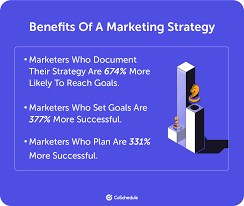The Power of a Strong Marketing Strategy
In today’s competitive business landscape, having a well-defined marketing strategy is crucial for the success of any company. A marketing strategy serves as a roadmap that guides businesses in reaching their target audience, promoting their products or services, and ultimately achieving their goals.
One of the key benefits of a strong marketing strategy is that it helps businesses differentiate themselves from their competitors. By clearly defining their unique selling points and value proposition, companies can effectively communicate why customers should choose them over other options in the market.
Furthermore, a well-crafted marketing strategy enables businesses to identify and understand their target audience better. By conducting thorough market research and analysis, companies can tailor their messaging and campaigns to resonate with the specific needs and preferences of their customers.
Another important aspect of a marketing strategy is setting clear objectives and measurable goals. By establishing specific targets for sales, brand awareness, customer acquisition, or other key performance indicators, businesses can track their progress and evaluate the effectiveness of their marketing efforts.
Moreover, a comprehensive marketing strategy encompasses various channels and tactics to reach customers at different touchpoints along their buyer’s journey. From traditional advertising methods to digital marketing techniques such as social media, content marketing, and email campaigns, businesses can create an integrated approach that maximises their reach and engagement.
Ultimately, a strong marketing strategy not only drives revenue growth but also builds brand loyalty and customer relationships. By consistently delivering value to customers through targeted messaging and engaging experiences, businesses can foster long-term connections that translate into repeat business and referrals.
In conclusion, investing time and resources into developing a robust marketing strategy is essential for any business looking to thrive in today’s competitive marketplace. By understanding the power of strategic planning and execution, companies can position themselves for success and sustainable growth in the long run.
7 Key Benefits of a Strong Marketing Strategy for Business Success
- 1. Enhances brand visibility and recognition.
- 2. Helps businesses differentiate themselves from competitors.
- 3. Enables targeted communication with specific audience segments.
- 4. Drives customer engagement and loyalty.
- 5. Facilitates measurement of campaign effectiveness and ROI.
- 6. Supports product/service positioning and pricing strategies.
- 7. Contributes to long-term business growth and sustainability.
Seven Drawbacks of Marketing Strategy: Navigating Costs, Time, and Uncertainty
- 1. Costly investment
- 2. Time-consuming process
- 3. Uncertain outcomes
- 4. Competitive challenges
- 5. Resource constraints
- 6. Adaptability issues
- 7. Over-reliance on tactics
1. Enhances brand visibility and recognition.
A well-crafted marketing strategy plays a pivotal role in enhancing brand visibility and recognition. By consistently promoting the brand across various channels and touchpoints, businesses can increase their presence in the market and create a strong impression on their target audience. Through strategic branding initiatives, companies can establish a distinct identity that resonates with customers, making it easier for them to recognise and remember the brand amidst competition. This heightened visibility not only attracts new customers but also reinforces loyalty among existing ones, ultimately contributing to long-term success and growth for the business.
2. Helps businesses differentiate themselves from competitors.
In a crowded marketplace, a well-defined marketing strategy plays a pivotal role in helping businesses stand out and distinguish themselves from their competitors. By clearly articulating their unique selling points and value proposition, companies can effectively communicate why customers should choose them over other options available in the market. This differentiation not only attracts the attention of potential customers but also builds brand loyalty and trust, ultimately setting the business apart as a preferred choice among its competitors.
3. Enables targeted communication with specific audience segments.
One significant advantage of a well-crafted marketing strategy is its ability to enable targeted communication with specific audience segments. By identifying and understanding the unique characteristics, preferences, and behaviours of different customer groups, businesses can tailor their messaging and campaigns to resonate with each segment effectively. This targeted approach ensures that the right message reaches the right audience at the right time, increasing the likelihood of engagement, conversion, and long-term customer loyalty.
4. Drives customer engagement and loyalty.
A well-crafted marketing strategy plays a pivotal role in driving customer engagement and fostering loyalty. By creating targeted campaigns and personalised messaging that resonate with the needs and preferences of customers, businesses can establish meaningful connections with their target audience. Through consistent communication and value delivery, companies can cultivate trust and loyalty among customers, encouraging repeat business and advocacy. This focus on engagement not only enhances the overall customer experience but also strengthens the bond between the brand and its audience, leading to long-term relationships that benefit both parties.
5. Facilitates measurement of campaign effectiveness and ROI.
A significant advantage of a well-defined marketing strategy is that it facilitates the measurement of campaign effectiveness and return on investment (ROI). By setting clear objectives and key performance indicators (KPIs) in the marketing strategy, businesses can track the success of their campaigns and evaluate the impact of their marketing efforts on their bottom line. This data-driven approach enables companies to make informed decisions, optimise their marketing tactics, and allocate resources effectively to maximise ROI.
6. Supports product/service positioning and pricing strategies.
A well-crafted marketing strategy plays a pivotal role in supporting product/service positioning and pricing strategies. By clearly defining the unique value proposition of a product or service and understanding the competitive landscape, businesses can effectively position their offerings in the market to highlight their strengths and differentiate themselves from competitors. Additionally, a strategic marketing approach helps companies determine the optimal pricing strategy based on factors such as perceived value, target market segments, and competitive pricing analysis. Through aligning product/service positioning with pricing strategies, businesses can maximise their market appeal and profitability while meeting the needs and expectations of their customers.
7. Contributes to long-term business growth and sustainability.
A well-crafted marketing strategy plays a pivotal role in contributing to long-term business growth and sustainability. By aligning marketing efforts with overarching business objectives, companies can establish a strong foundation for continuous expansion and success. Through strategic planning and execution, businesses can cultivate brand loyalty, attract new customers, and retain existing ones, thereby ensuring a steady revenue stream over time. By focusing on sustainable growth practices and adapting to changing market dynamics, a robust marketing strategy enables companies to thrive in the long run and remain competitive in their industry.
1. Costly investment
One notable drawback of marketing strategy is the substantial financial investment it demands, which can pose a significant challenge for small businesses operating on constrained budgets. Developing and executing a comprehensive marketing plan often involves expenses related to market research, advertising campaigns, promotional materials, and hiring skilled professionals. For smaller enterprises with limited resources, the cost of implementing an effective marketing strategy can strain their financial capabilities and potentially divert funds from other critical areas of business operations. As a result, the high costs associated with creating and sustaining a robust marketing strategy can present a barrier to entry for small businesses seeking to compete in the marketplace.
2. Time-consuming process
Crafting an effective marketing strategy can be a time-consuming process that requires meticulous research, analysis, and planning. This intensive focus on developing a comprehensive strategy may divert attention from other critical operational tasks within a business. The time and resources dedicated to formulating and implementing a marketing strategy could potentially hinder the progress of day-to-day operations, leading to delays in other essential functions. Balancing the demands of strategic marketing planning with the need to address immediate operational requirements poses a significant challenge for businesses aiming to maintain efficiency and productivity across all aspects of their operations.
3. Uncertain outcomes
One significant drawback of implementing a marketing strategy is the uncertainty surrounding its outcomes. Despite meticulous planning and strategic execution, there remains a level of unpredictability in the results achieved. Market dynamics and consumer behaviour are constantly evolving and can be influenced by various external factors beyond the control of businesses. This unpredictability poses a challenge for companies as they strive to align their marketing efforts with shifting trends and customer preferences, making it difficult to guarantee that the desired results will be achieved through the chosen strategy.
4. Competitive challenges
In crowded marketplaces, the competitive challenges posed by the need to stand out with a marketing strategy can be daunting. The task becomes even more difficult when competitors are also investing in aggressive marketing tactics. With everyone vying for attention and market share, businesses must navigate through a sea of noise and competition to ensure their message cuts through and resonates with their target audience. This intense competition can make it challenging for companies to differentiate themselves effectively and capture the attention of potential customers amidst the clamour of rival marketing efforts.
5. Resource constraints
Resource constraints pose a significant challenge when it comes to implementing a comprehensive marketing strategy. Limited human resources or expertise in certain areas of marketing, such as digital marketing, can impede the effective execution of planned initiatives. Without the necessary skills and manpower to carry out various marketing activities, businesses may struggle to fully leverage the potential of their strategy and reach their target audience optimally. This con highlights the importance of investing in talent development and possibly outsourcing expertise to overcome resource limitations and ensure the successful implementation of a holistic marketing approach.
6. Adaptability issues
One significant drawback of marketing strategy is the challenge of adaptability issues. In a dynamic business environment where market conditions and consumer preferences change swiftly, companies often struggle to keep up with the pace of evolution. This necessitates continuous adjustments to the marketing strategy in order to stay relevant and effective. Failure to adapt promptly to shifting trends and consumer behaviours can result in missed opportunities and reduced competitiveness in the market. The need for constant vigilance and flexibility poses a considerable challenge for businesses aiming to maintain a strong market presence and meet evolving customer demands.
7. Over-reliance on tactics
An inherent drawback of marketing strategy lies in the risk of over-reliance on tactics. When businesses concentrate solely on implementing tactical components without a well-defined strategic framework, it can result in disjointed efforts and less-than-optimal outcomes. Without a cohesive strategy to guide these tactics, the overall effectiveness and efficiency of marketing initiatives may be compromised, leading to missed opportunities and inefficient resource allocation. It is essential for businesses to strike a balance between tactical execution and strategic alignment to ensure that their marketing efforts are integrated, coherent, and ultimately successful in achieving their overarching goals.



